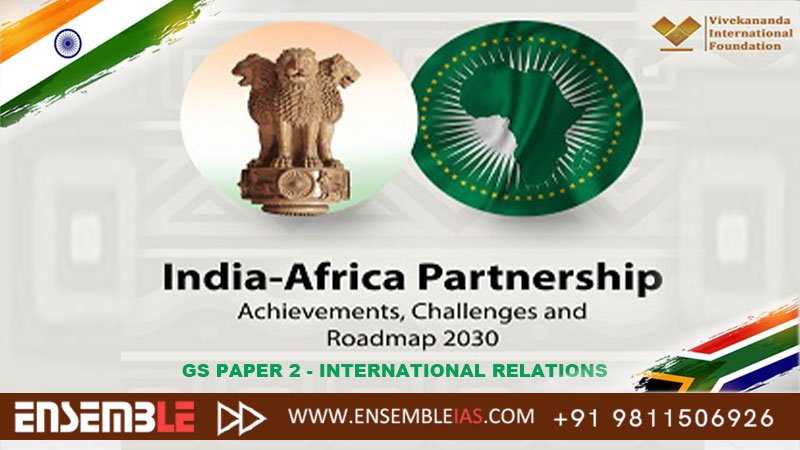India-Africa Partnership: Achievements, Challenges and Roadmap 2023
The Vivekananda International Foundation has presented the VIF Report titled “India-Africa Partnership: Achievements, Challenges and Roadmap 2023” by the 20-member Africa Expert Group (AEG).The demographic, economic, political, and social shifts taking place in Africa are all examined in the report.
The link to join the course : Online Courses
The main section is called “Roadmap 2030,” which is made up of over 60 policy recommendations aimed at strengthening and expanding the India-Africa collaboration. They deal with four topics.
Political and diplomatic cooperation
- Political-level dialogue between African and Indian leaders needs to be placed on a regular and institutional basis.
- The India-Africa Forum Summit may be held once in three years, alternately in Africa and India.
- The Ministry of External Affairs needs to undertake an internal review and assess the degree of actual implementation of decisions taken and commitments announced at the past three summits.
- An Annual Strategic Dialogue involving the Chairperson of the African Union (AU) Commission and India’s External Affairs Minister should be started in 2023. It may be held alternately in Addis Ababa and New Delhi.
- As G20’s President, India hosted the ‘Voice of the Global South Summit’ in January 2023. Government announced new initiatives: i) Aarogya Maitri (Wellness Friendship), ii) Global South Center of Excellence, iii) Global South Science and Technology Initiative, iv) Global South Young Diplomats Forum and v) Global South Scholarships. Africa, ‘the heart of the Global South’, should particularly benefit from these schemes, bringing an element of additionality over and above the assistance provided to the African nations within the IAFS framework.

Defence and security cooperation
- New Delhi should increase the number of defence attaches deployed in the African continent
- While India has made efforts to increase maritime cooperation with East African coastal countries, efforts may be made towards greater maritime collaboration with regional mechanisms in West Africa.
- India and African countries share concerns about terrorism. India may arrange for a Deputy National Security Adviser/National Security Adviser level dialogue on counter-terrorism with as many African countries as necessary.
- India may extend more lines of credit to African countries for facilitating defence exports and increase defence training slots offered to African countries under ITEC.
- India and African countries may enhance cooperation in emerging technologies and cybersecurity.
Economic and development cooperation
- Economic engagement through established mechanisms like Joint Commission meetings and Joint Trade Council meetings need to be ensured on a regular basis to chart out the near-term term and medium-term goals aligned with the actual needs of the African states.
- Indian Heads of Mission in Africa should be made accountable for the timely implementation of projects through close monitoring.
- The sharing of legal and technical advances in digital identity may help anchor Africa’s optimisation of digital services trade and integration.
- The creation of an Escrow mechanism with African countries could be a way to enhance the country’s exports to Africa, which will ensure exporters’ security and help in balancing the trade gap.
- CII and India Exim Bank should be encouraged to replicate this initiative in Africa.
- Access to finance has been a major hurdle for Indian businesses. A good remedy will be the creation of the Africa Growth Fund (AGF), which should ideally follow a model anchored by an Indian financial institution along with the participation of International Financial Institutions (IFIs).
- Regarding the shipping sector – Transportation of African EXIM and coastal trade; Ship and maritime assets Classification Services; Maritime administration service; Green fund for the development of maritime activities; Seafarers’ Training and Employment.
- Trade and investment barriers should be addressed and eliminated.
- Bureaucratic processes need to be fast-tracked.
- India may consider establishing manufacturing zones selectively in African locations, instead of focusing only on the export of goods.
- The currency swap is an idea that may be considered seriously. Invoicing in rupees could be a game changer for India-Africa trade
Socio-cultural cooperation
- Adequate sources should be allocated for African studies in India.
- Existing faculties in India need to fill vacancies, provide contemporary course work to students, and host socio-cultural events introducing Indian students and a wider audience to contemporary African artists, performers, thinkers, and authors
- It would be beneficial to establish Track-II mechanisms at the regional or sub-regional level with former Indian ambassadors in Africa, defense attachés, think tanks, well-known NRIs and citizens who can regularly interact with their counterparts and government organizations, interlocutors and think tanks to provide constant feedback for adjusting the policy, where necessary.
- India should also consider opening new educational institutes in Africa instead of merely giving scholarships.
- To bridge the awareness gap about Africa in India, a National Museum of Africa and the latter’s historical relationship with India should be conceived and established in the national capital.
- A Network of India-Africa Think Tanks (NIATT) should be created and managed with the government’s financial support.
(https://www.vifindia.org/sites/default/files/India-Africa-Partnership-Achievements-Challenges-and-Roadmap-2030.pdf)
The paper also recommends a unique framework for carrying out the “Roadmap 2030.” A team of officials working under the joint direction of the Secretary, Africa in the MEA, and a designated Deputy National Security Adviser will be most effective in securing this in close coordination between the MEA and the National Security Council Secretariat.
Best Online Coaching for Civil Service_IAS_ UPSC_IFS_IPS, Free Study Material ENSEMBLE IAS ACADEMY
Call +91 98115 06926
Visit us:- https://ensembleias.com/
Online Store: https://online.ensemble.net.in/
Email: ensembleias@gmail.com
#india_africa_partnership #international_relations#achievements #challenges #roadmap #GSPaper3 #environment #GSPaper2 #social_issues #economy #civilservicesstudy #ensembleiasacademy #geographyoptional #k_siddharthasir #ias #civilservices #upsc_motivation #upsc_aspirants #upsc_exam #trendsingeography #trendofquestions #geographytrends #civilservicesstudy #ensembleiasacademy #geographyoptional #k_siddharthasir #ias #civilservices #upsc_motivation #upsc_aspirants #upsc_exam #strategicthinker




